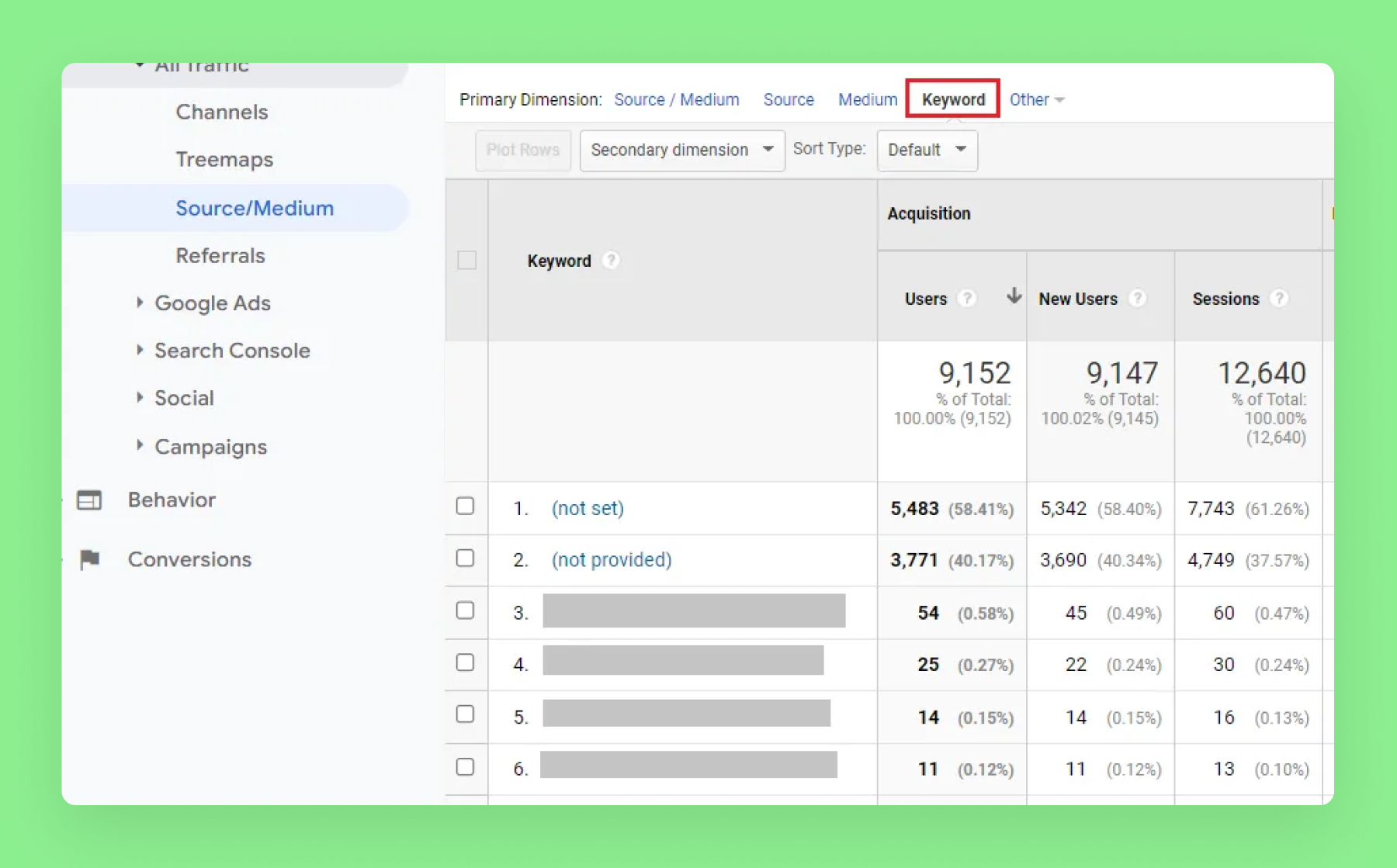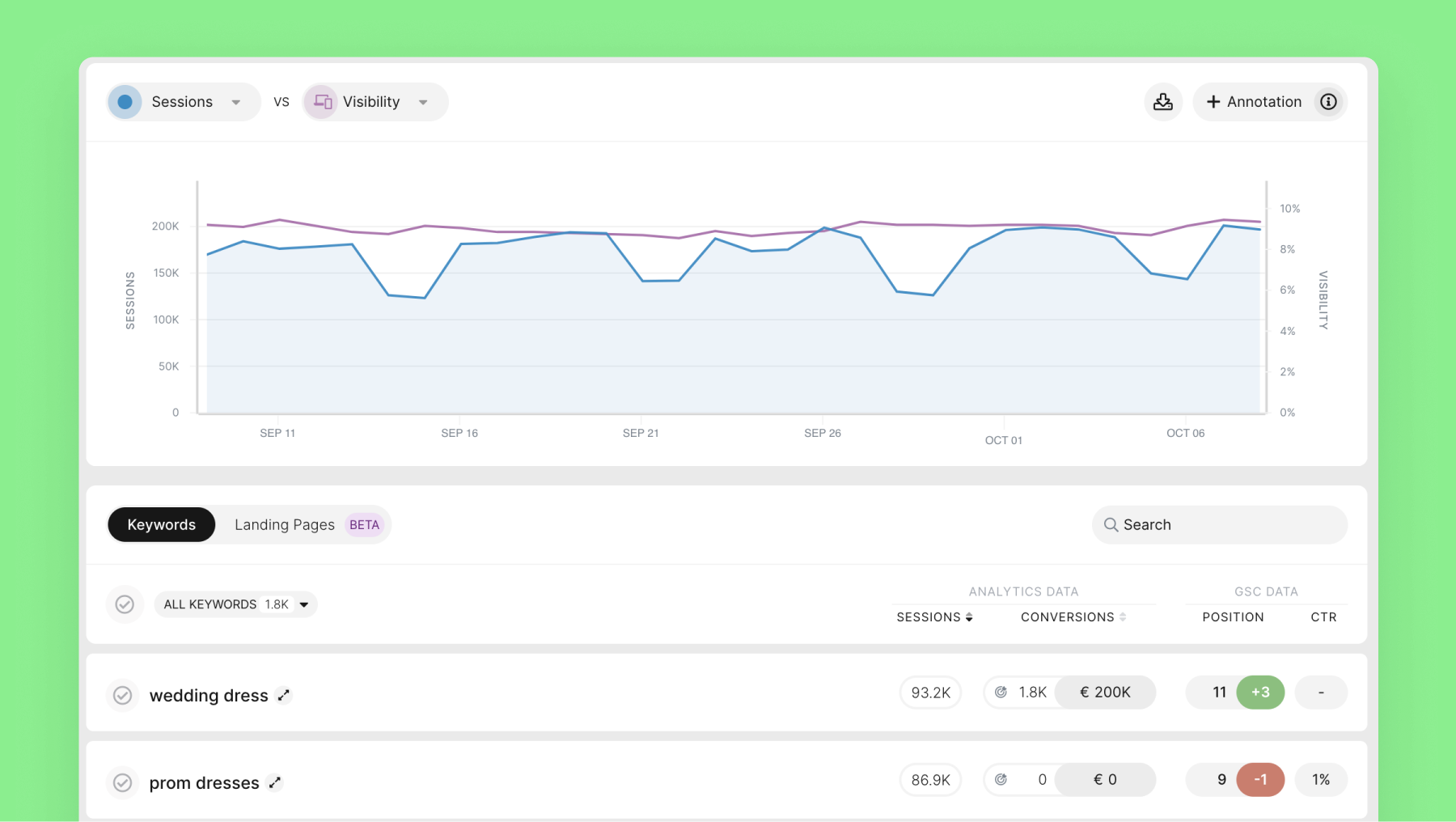The challenge of understanding which keywords drive traffic to your website has become increasingly complex since Google introduced the “keyword not provided” phenomenon. Marketers and SEO professionals worldwide have faced difficulties in gaining clarity on the specific search terms that contribute to website traffic. However, there are effective ways to address this issue. In this article, we will explore what “keyword not provided” entails, why it is significant, and how you can still extract valuable insights despite this limitation. Whether you are an experienced SEO professional or new to digital marketing, you will find practical strategies to refine your approach and make informed, data-driven decisions in this landscape of limited keyword visibility.
“Keyword not provided” in Google Analytics represents a significant challenge for digital marketers. It refers to the encrypted search data that Google withholds from website owners and marketers. This change began in 2011 when Google started encrypting searches for logged-in users, eventually expanding to include all searches by 2013. Consequently, the specific search terms used by visitors to find a website through organic search became unavailable in Google Analytics reports, making it difficult for marketers to understand user behavior.
Google introduced this change primarily to enhance user privacy, preventing website owners from potentially identifying individuals based on their search queries. For SEO professionals, this “not provided” issue has necessitated a fundamental shift in how SEO strategies are crafted and assessed.
Despite these limitations, skilled marketers can still obtain valuable insights into search trends and user behavior. By leveraging Google Search Console data, analyzing landing page performance, and utilizing third-party tools, they can develop a more comprehensive understanding of their organic search performance. In the following sections, we will explore how these challenges have reshaped the SEO landscape and how you can adapt your strategies to succeed in this evolving environment.

The introduction of “not provided” keywords in analytics has significantly impacted the SEO community, requiring digital marketers to adapt their strategies and develop innovative methods to gather insights on organic search performance.
Without direct access to the specific organic keywords that Google Analytics previously provided, SEO practitioners now rely on alternative methods to understand user intent and search behavior. This shift has increased the emphasis on analyzing landing page performance, user engagement metrics, and overall site structure to infer the types of queries driving traffic.
The “Google Analytics organic search keyword not provided” issue has led to more holistic SEO strategies. Marketers are now focusing on broader topics and themes that align with user search intent, resulting in more comprehensive content strategies that address a wider range of related queries. This approach improves overall search visibility and helps create a stronger online presence.
This change has also elevated the importance of tools such as Google Search Console and third-party SEO platforms. These resources are now important for gaining insights into search performance and identifying optimization opportunities. Marketers rely heavily on these tools to understand which queries drive impressions and clicks, even if they cannot directly associate them with specific user sessions in Google Analytics.
Furthermore, the “keyword not provided” phenomenon has encouraged a greater focus on user experience and content quality. With less emphasis on targeting specific keywords, SEO professionals are prioritizing factors like site speed, mobile-friendliness, and engaging, informative content that satisfies user intent. This shift aligns with search engine algorithms that increasingly favor high-quality, user-centric websites.
In the following sections, we will explore methods to recover valuable keyword data despite these challenges, helping you stay ahead in the ever-evolving world of SEO.
Despite the challenges posed by Google Analytics organic keywords not provided, several clever methods exist to recover valuable keyword data and gain insights into organic search performance. By employing these techniques, marketers can work around the “not provided” issue in Google Analytics organic search and make informed decisions about their SEO strategy. It’s like being a detective, piecing together clues to solve the keyword mystery.
Here are some effective methods to recover keyword data:
Let’s dive deeper into two of these methods: using Google Search Console and leveraging landing page reports.
Google Search Console emerges as a powerful ally in recovering valuable keyword data. This free tool provides insights into how Google views your site and the queries that lead users to your content. By linking Google Search Console to your Google Analytics account, you can unlock a treasure trove of keyword information previously hidden behind the “(not provided)” veil.
To leverage Search Console effectively:
While Search Console data has limitations, such as covering only the last 16 months and aggregating data, it remains an invaluable resource for recovering keyword insights in the era of “not provided”. Now, let’s explore how landing page reports can complement this approach.
While Google Analytics organic search not provided data limits direct keyword insights, landing page reports offer a clever workaround for understanding search intent and performance. By analyzing the pages users land on from organic search, you can infer the types of queries driving traffic to your site. It’s like reading between the lines to uncover hidden meanings.
To leverage landing page reports effectively:
By combining these metrics with landing page data, you can develop a nuanced understanding of how well your content aligns with search queries, despite the limitations imposed by keyword not provided. However, these methods are just the beginning. Let’s explore additional tools and strategies to gain even more comprehensive keyword insights.
To overcome the challenges posed by not provided Google Analytics keyword data, savvy marketers can employ a variety of alternative tools and strategies. These methods can help fill the gap left by the lack of organic keywords Google Analytics data, allowing you to stay ahead of the competition:
By combining these alternative tools and strategies, marketers can build a comprehensive picture of their keyword landscape, despite the limitations imposed by the not provided Google Analytics keyword issue. It’s like assembling a jigsaw puzzle – each piece contributes to the bigger picture. One particularly powerful solution that addresses these challenges is SEOmonitor.

SEOmonitor offers a robust solution to the challenges posed by keyword not provided in Google Analytics. This innovative tool addresses the limitations of Google Analytics keyword not provided by leveraging advanced algorithms and multiple data sources to provide comprehensive keyword insights. It’s like having a Swiss Army knife for SEO – versatile, powerful, and indispensable.
Key features of SEOmonitor include:
By providing a clear view of keyword-level metrics and offering a suite of complementary SEO tools, SEOmonitor empowers marketers to make data-driven decisions and optimize their content strategies effectively, even in the face of keyword not provided challenges. With these insights in mind, let’s explore best practices for SEO in this new landscape.
In light of the Google Analytics organic keywords not provided issue, SEO professionals must adapt their strategies to maintain effectiveness. It’s time to evolve from keyword-centric thinking to a more holistic, user-focused approach. Consider these best practices to stay ahead of the curve:
As we’ve seen, the “keyword not provided” challenge has transformed the SEO landscape, pushing us to adopt more sophisticated and holistic approaches. While it may seem like a setback, it’s actually an opportunity to deepen our understanding of user intent and create more valuable content. By leveraging the tools and strategies we’ve discussed – from Google Search Console to SEOmonitor – you can continue to refine your SEO efforts and drive meaningful results.
Remember, the key is to stay adaptable, focus on user experience, and always keep learning. The world of SEO is ever-changing, but with the right mindset and tools, you can turn challenges into opportunities for growth. So, what’s your next move in mastering SEO in the era of “keyword not provided”? Will you dive deeper into user intent analysis, or perhaps explore new tools to gain keyword insights? The choice is yours, but one thing’s for certain – the future of SEO belongs to those who can adapt and innovate in the face of challenges.